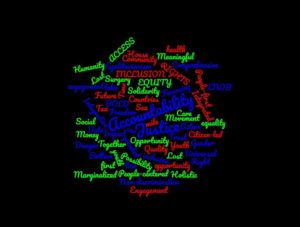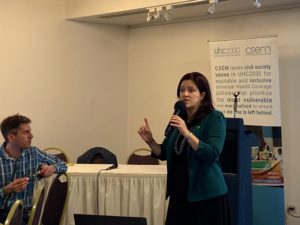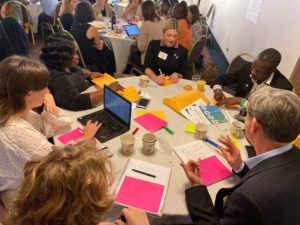 On September 25, 2019, following the United Nations High-Level Meeting on Universal Health Coverage (UN HLM on UHC), which was convened on September 23, the CSEM hosted the Post-HLM Civil Society Strategy Session. The event provided a platform for civil society organizations to share plans and strategize on advocacy and accountability efforts at the country level for the operationalization of the UN HLM on UHC political declaration. Over 100 representatives of civil society organizations from various regions participated. Dr. Justin Koonin, President of ACON and Advisory Group member of the CSEM, moderated the event and opened by inviting everyone to indicate in one word what, to them, is central to building Universal Health Coverage (UHC). Most responses highlighted the importance of inclusion and accountability.
On September 25, 2019, following the United Nations High-Level Meeting on Universal Health Coverage (UN HLM on UHC), which was convened on September 23, the CSEM hosted the Post-HLM Civil Society Strategy Session. The event provided a platform for civil society organizations to share plans and strategize on advocacy and accountability efforts at the country level for the operationalization of the UN HLM on UHC political declaration. Over 100 representatives of civil society organizations from various regions participated. Dr. Justin Koonin, President of ACON and Advisory Group member of the CSEM, moderated the event and opened by inviting everyone to indicate in one word what, to them, is central to building Universal Health Coverage (UHC). Most responses highlighted the importance of inclusion and accountability.
In a brief overview of the UN HLM on UHC, Amy Boldosser-Boesch of the CSEM Secretariat raised some key points on the Political Declaration of the High-Level Meeting on Universal Health Coverage adopted during the meeting, “Although we did not get everything we asked for, there are many areas of the document which reinforce the 2030 Agenda for Sustainable Development and align with some of the asks we made ahead of the meeting.” She went on to discuss some of the priorities found in the political declaration, that civil society can use for post-HLM advocacy:
-
 Reference to the right to health and non-discrimination which reinforce agenda 2030
Reference to the right to health and non-discrimination which reinforce agenda 2030- Focus on health promotion and the health workforce including women health workers and issues of remuneration
- Sexual and Reproductive Health Rights and migration, community engagement, and the need for partnerships
- Data and country-level accountability, including calls for national targets and monitoring
- Health financing, particularly reduction of out-of-pocket costs, investment in primary health care, and placing people and communities at the center of health systems.
Eighty-three UN Member States also made national statements, but very few commitments, on their plans to advance UHC in their respective countries. Some of the gaps in the political declaration noted by the participants are that there is not enough emphasis on, or mention of: sexual diversity, specific financial targets, disaggregated data, definition of partnerships, investment in social protection, and disability. Sharing lessons from the Non-Communicable Disease community, Priya Kanayson of NCD Alliance said that a noticeable gap with all recent high-level meetings is a lack of financial commitments to back up the promises made. “We need national time-bound targets and financing to ensure progress to implement UHC.”
 In diverse, vibrant, and interactive group sessions, civil society outlined their priorities for taking the outcome of the UN HLM on UHC forward. Civil society representatives indicated their readiness to collaborate on the development of measurable targets towards building UHC and urged UHC2030 to work with governments and UN agencies to facilitate this process at the country level. To enhance accountability, governments should develop monitoring reports on adherence to the political declaration, ensuring that: 1) civil society has the opportunity to collaborate in developing the accountability framework for the declaration; 2) the accountability framework should take into consideration decentralization, not just the national level and explore how post-HLM meetings that will be supported at the national level can involve or cascade down to sub-national level in a meaningful way; 3) Facilitate the development of community monitoring tools in various languages or tools to help communities develop their own context-specific monitoring tools.
In diverse, vibrant, and interactive group sessions, civil society outlined their priorities for taking the outcome of the UN HLM on UHC forward. Civil society representatives indicated their readiness to collaborate on the development of measurable targets towards building UHC and urged UHC2030 to work with governments and UN agencies to facilitate this process at the country level. To enhance accountability, governments should develop monitoring reports on adherence to the political declaration, ensuring that: 1) civil society has the opportunity to collaborate in developing the accountability framework for the declaration; 2) the accountability framework should take into consideration decentralization, not just the national level and explore how post-HLM meetings that will be supported at the national level can involve or cascade down to sub-national level in a meaningful way; 3) Facilitate the development of community monitoring tools in various languages or tools to help communities develop their own context-specific monitoring tools.
Civil society present in the meeting also emphasized the need for more resources to enable the CSEM to be more representative of global civil society. Other resources needed to ensure that civil society and communities can be fully engaged in taking forward the outcomes and commitments from the HLM include grants to support country-level civil society advocacy and capacity building, national pooled funding mechanisms for civil society action, national platforms to coordinate UHC advocacy and raise sub-national voices, as well as regional platforms for technical assistance. Participants also emphasized the importance of data in order to inform the implementation of “Leave No One Behind” as committed to in the 2030 Agenda for Sustainable Development.
Dr. Koonin ended the meeting by appreciating the input of civil society and reiterated coordination and collaboration will be key as we enter the post-HLM phase where monitoring of the implementation of the political declaration. He noted that “Members of the CSEM Advisory Group will share the priorities and requests for support from this meeting at the UHC2030 post-HLM strategy meeting, ensuring that the multi-stakeholder partnership is aware of civil society’s readiness and willingness to play an active role in taking forward the HLM outcomes and ensuring accountability for leaving no one behind.”
UHC2030 will provide a summary of the outcomes of the UHC2030 Strategy Meeting on the UHC2030 website in the coming days. The CSEM Secretariat and Advisory Group are also committed to responding to requests from this meeting regarding advocacy tools and learning opportunities to strengthen national-level advocacy on UHC. Please join the CSEM to receive the CSEM Voices newsletter and follow us on Twitter for updates on tools and upcoming webinars.
To browse moments of CSEM engagement during UNGA, visit our Multimedia page.
UN HLM on UHC-Related Links:

